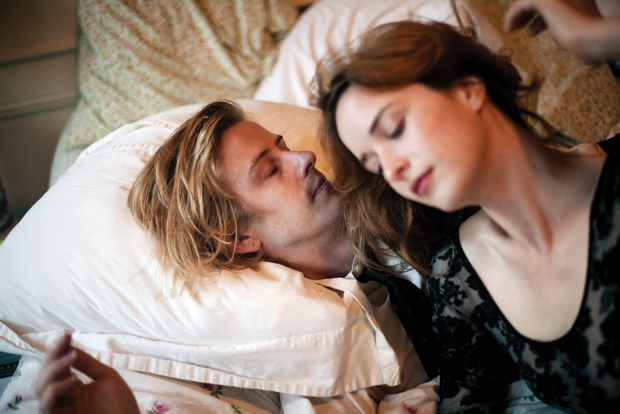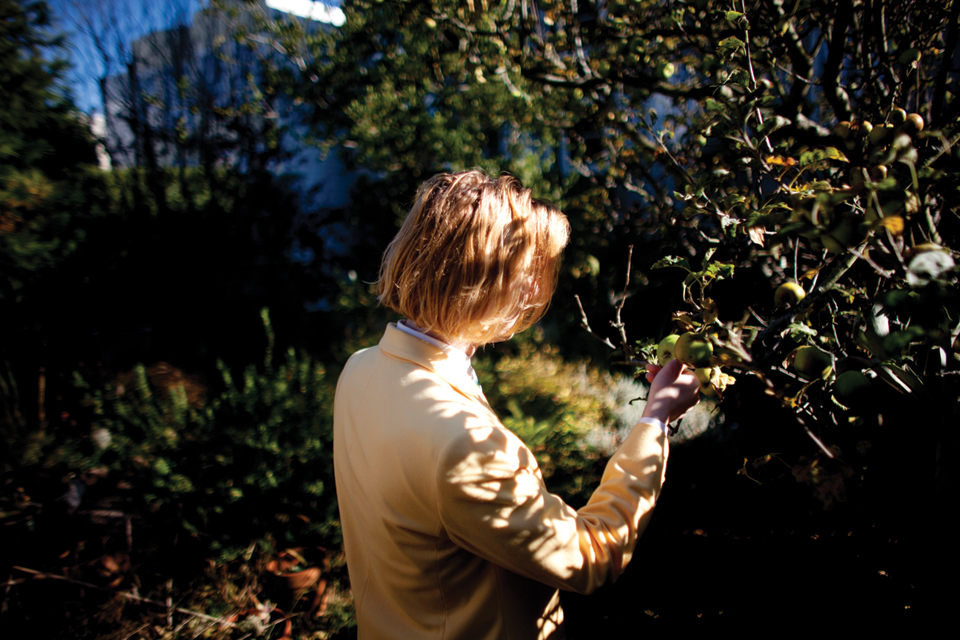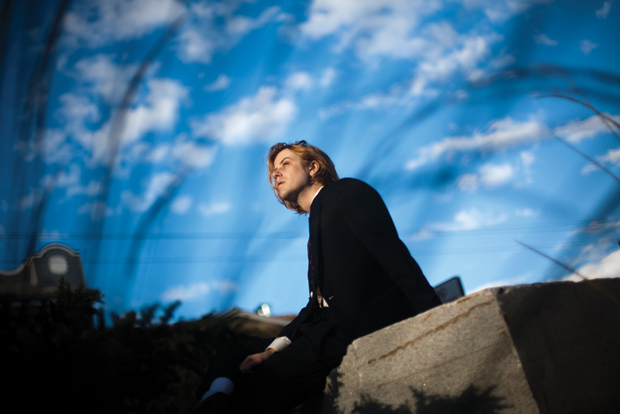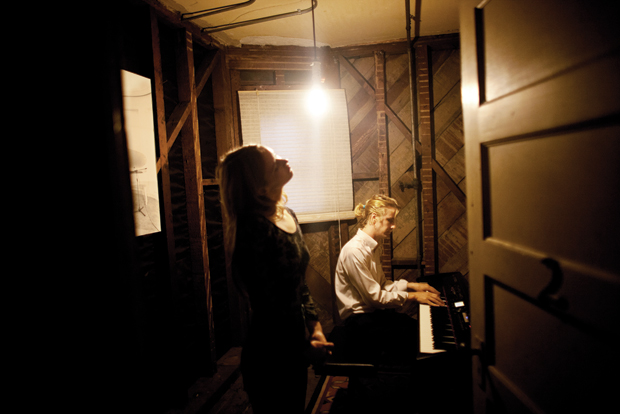The former Girls frontman sets out on his own.
On the morning of July 2, 2012, Christopher Owens rose with the sun. His mind was restless, he had slept poorly and the room at his sister’s house in Chicago, where he was staying, was flooded with light. Lying in bed, Owens checked his email. There was a message from a music blogger asking about rumors that Girls, Owens’ band of the past five years, was breaking up. After calling his manager and texting with his bandmate, JR White, Owens pulled up a statement he’d prepared back home in San Francisco, divided it up into three tweets and blasted them out to the world. “Dear all,” he wrote. “This may come as a surprise to many & has been an issue of much thought for me. My decision was not easy to make. I am leaving Girls. My reasons at this time are personal. I need to do this in order to progress. I will continue to write & record music. More will be announced soon. I thank you all for everything. Sincerely—Christopher.” Turning off his phone, Owens joined his sisters in the kitchen for coffee. He wanted to spend the day with his family.
 Since Girls’ debut, Album, was released in 2009, people have gone bonkers for Owens timeless pop songs, which blend existential ambivalence with the bleached optimism of a postmodern romantic. In a musical moment dominated by bombastic rap, synthetic EDM and scuzzy, dissonant noise rock, Girls bucked fashion and went in the opposite direction, toward sincerity, simplicity and transparency, with dollops of alienation to temper the sweetness. Riffing on classic genres including surf rock, doo-wop and metal, Girls expressed the beleaguered but tender perspective of an orphan in the world. Owens wrote dirges called “Vomit,” “End of the World” and “Die,” but also lovey-dovey songs called “Honey Bunny,” “Darling” and “Summertime.” An emotional polyglot, he wasn’t about to commit to one side of the fence or the other; he was both.
Since Girls’ debut, Album, was released in 2009, people have gone bonkers for Owens timeless pop songs, which blend existential ambivalence with the bleached optimism of a postmodern romantic. In a musical moment dominated by bombastic rap, synthetic EDM and scuzzy, dissonant noise rock, Girls bucked fashion and went in the opposite direction, toward sincerity, simplicity and transparency, with dollops of alienation to temper the sweetness. Riffing on classic genres including surf rock, doo-wop and metal, Girls expressed the beleaguered but tender perspective of an orphan in the world. Owens wrote dirges called “Vomit,” “End of the World” and “Die,” but also lovey-dovey songs called “Honey Bunny,” “Darling” and “Summertime.” An emotional polyglot, he wasn’t about to commit to one side of the fence or the other; he was both.
Part of the reason Girls’ fan base is so passionate is that Owens is a credible source on matters of hard living and loving, having earned his humanity in more dramatic fashion than most. Born in Florida, he was raised abroad (mainly Asia and Europe) in the religious fundamentalist cult Children of God, fleeing at age 16 to live with his sister in Amarillo, Texas. There, he fell in with the local hardcore punk scene and was taken under the wing of Stanley Marsh 3, the oil heir turned eccentric artist and philanthropist who became Owens’ best friend and mentor. Owens eventually left Texas for the Bay Area, where he found a spiritual home in the San Francisco’s nocturnal creative enclaves, met JR White, took a bunch of drugs and made his first record. His biography might smack of the exotic, but the expressions of longing and restlessness in Owens’ songs are universal, resonating with kids who had grown up nuclear in even the beigest of American suburbs. When I first saw Girls, at the Troubadour in Los Angeles in 2009, during the domestic tour for Album, Owens—clad in ribbed red tights, an oversize black Bush T-shirt and white Nikes—seemed to represent a specimen of alternative masculinity that elaborated on the legacy of artists like David Bowie and Kurt Cobain. Obscured behind a curtain of hair and backlit by a bluish TV glow, he looked like a dirty angel or Gus Van Sant urchin hustler, and the crowd in the sold-out room seemed hungry enough, and turned on enough, by his introverted magnetism to devour him in one swallow. Just offstage, a group of long-limbed female acquaintances perched on the stairs and watched in rapt adoration. Guys dug him, too.
After five years and tens of thousands of records sold, Girls’ breakup registered to some of its public as a personal blow or a broken promise. When Owens’ announced he was leaving, the reaction was baffled, bummed out and even a little pissed. There were plenty of kind words of encouragement, but some quasi-jokey headlines went straight for the jugular, like Hipster Runoff’s “Christopher Owens Quits Girls Because His Ego is Huge and He Wants to Be More Famous.” In the months following Owens’ announcement, he and White remained silent about the band’s death, and in lieu of facts, speculation triumphed. Had Owens, the creative engine behind the songs, grown resentful of operating within the democracy of a band? Though frequently tweeting aphorisms, smileys and thoughts on the books he was reading, Owens remained elusive about his plans until September, when it was announced he would model for Saint Laurent Paris, starring in a series of black-and-white photographs for Hedi Slimane’s debut as creative director of the label. Slimane, who photographed the ads himself, is a huge fan of Girls. The two met at Coachella in 2010 and, “We just liked each other—I liked him, we connected,” says Owens. Owens has the kind of unwashed innocence and joli-laid beauty that attracts both chicken hawks and artists. Slight, tired and a little androgynous, on the street he could be mistaken for a 16-year-old playing hooky, but put him onstage or in front of a camera and he becomes a star.
With the exception of his modeling, Owens continued to keep quiet, but he wasn’t sitting still. True to his word, he’d been making music, recording his debut solo album, Lysandre, in Los Angeles with Doug Boehm, who also produced the final Girls album, Father, Son, Holy Ghost. Working primarily with session musicians, Owens was also joined on the project by former Girls members Matt Kallman on keyboards and Evan Weiss on guitar. At the end of September, when recording finished, I went to Boehm’s house in Highland Park to listen to the rough mix a few hours before Owens and his girlfriend, Hannah Hunt (formerly of the band Dominant Legs), who sings backup vocals on the new record, made the long drive back to San Francisco. A handful of Owens’ friends and colleagues gathered in Boehm’s workspace off the dining room while he cued up the computer and played three tracks out of sequence. They’d been working on these songs for weeks and were spent and speechless. Owens, bleary-eyed in jeans and soccer shoes, speed-tapped his foot, then stood up and left the room, reappearing when the songs had finished. LA was in the middle of an unholy heat wave, and he and Hunt said they were ready to get back to the gentler climate of their home turf.

The next time I see Owens, it’s an overcast late afternoon in October, just outside San Francisco’s leafy Panhandle. He answers his front door, a placid figure in corduroy and plaid, his hair and skin matching shades of vanilla. Back in his domestic element and a couple of weeks out of the bunker mentality of recording, Owens seems at ease. Inside the apartment he and Hunt share, the bed is made, the many houseplants are not only alive but thriving and the fruit bowl is full. TLC’s “Waterfalls” plays softly in the background. Shelves of records and books line the living room walls. Owens, a voracious reader and monster Harry Potter fan—he has “Hermione” tattooed on the heel of his left hand—has just started A Casual Vacancy, JK Rowling’s new book for grownups. “I’m not that far in yet,” he says, withholding verdict. By his bedside, a collection of Christopher Hitchens’ essays rests near an acoustic guitar and a helmet riddled with bullet holes. Owens puts on water to boil for tea and takes a seat at the dining room table.
In conversation, Owens is plainspoken and matter-of-fact, seemingly comfortable enough in his skin to pause awhile when completing thoughts. He’s says he’s cool with talking about Girls because he’s proud of the work and knows the band must be addressed in order to get to Lysandre, but he isn’t enthusiastic about doing an autopsy. “The first week or so after [Girls broke up], I pretty much only talked to JR and my family," he says. "I didn’t do any work. I reflected on what just happened." He spent a month visiting friends and family, shot the Saint Laurent pictures in New York and then, in August, came to LA to work on Lysandre, which will be released on Fat Possum. He shakes his head over the deluge of misinformation circulated about Girls’ dissolution. “I’ve had people send me articles, ‘Christopher broke up Girls to go model,’ just ridiculous things,” he says. “That’s ridiculous to me because I didn’t break up the band, for one, and people tell me, ‘I’m really sad about the band breaking up,’ like they expect me to not know what that’s like. Which is crazy, because I’m the person who’s the most sad about the band breaking up.” Asked what he means about not breaking up the band, Owens clarifies: “It was my choice. At the same time, that doesn’t mean that it was something I did without reason. The band—conceptually, the band Girls—kind of never really came together.”
With Owens and White as the group’s only permanent members, he says they were constantly starting back at square one, teaching the old songs to new players during whatever downtime they could scrounge out of a relentless schedule of touring and recording. “I added it up once and something like 21 people had played in Girls, over two albums and one EP. That’s extremely frustrating and doesn’t really show that there ever really was a band, in my mind,” he says. He explains that Girls’ revolving door of personnel, along with the speed of their success and the public demand for output, made it impossible to progress as a unit. “It’s not anybody’s fault; it’s just the way it worked out,” he says. “The anticipation for live shows and for us to be a band was so big and went so fast that that was the only way that we could do it. We could never spend the time to make a band, and that was a bit of a mistake, in hindsight.”
After Girls played what would be its last show at Primavera in June, Owens and White took a break. Their contract with record label True Panther Sounds was complete, and with White taking August and September to produce a Spectrals album, it seemed like a natural time to end things. Owens is careful to protect his personal relationships, but when asked if anyone in or around Girls wanted the project to continue, he acknowledges, without elaboration, that not everybody was delighted with his decision to walk away. The quick turnover of Lysandre may have complicated dynamics, too, since it’s one thing to break up in mutual agreement, and quite another to learn how quickly your ex has moved on.
 Matt Kallman, who played with Girls and also worked on the Owens’ solo album, puts it this way: “Maybe there was an initial shock that [Lysandre] is already wrapped up and the last Girls show was only four months ago. It doesn’t feel like that long to me.” Owens reports that he and White remain on good terms and speak frequently. “In a way, yes, he wanted to be in a band like I did with Girls, but in a way, I know what he really wanted was to be producing records, and he wasn’t really getting to, and now he is. JR’s good at what he does.” He adds, “I’ve never had a fight or a falling out with anyone I’ve played music with.” (Via email, White declined to comment for this story.)
Matt Kallman, who played with Girls and also worked on the Owens’ solo album, puts it this way: “Maybe there was an initial shock that [Lysandre] is already wrapped up and the last Girls show was only four months ago. It doesn’t feel like that long to me.” Owens reports that he and White remain on good terms and speak frequently. “In a way, yes, he wanted to be in a band like I did with Girls, but in a way, I know what he really wanted was to be producing records, and he wasn’t really getting to, and now he is. JR’s good at what he does.” He adds, “I’ve never had a fight or a falling out with anyone I’ve played music with.” (Via email, White declined to comment for this story.)
Overall, Lysandre is softer and more delicate than Girls. It’s a deeply considered concept project instead of a collection of singles, and in that sense, it may not be as easy to rally around. “He’s the most honest songwriter I think I’ve ever worked with,” says producer Doug Boehm. “He just puts it out there. And even if you don’t like the music, you have to like the honesty of it.” Whereas most albums begin with a pile of songs that is later whittled down to the best ones, Boehm says Owens arrived in the studio with a very specific idea about what he wanted—not just which songs, but their order and how they would be played. ‘“Just a Song” [on Father, Son, Holy Ghost] was pretty much the precursor to how this was gonna go,” says Boehm, but instead of that song’s Melotron imitation, Owens wanted a real flutist. “Which is scary—it doesn’t happen except for on Jethro Tull records,” says Boehm. “When someone says there’s gonna be a flute on six of the eight songs you’re a little scared, but it exceeded my expectations.”
After finishing tea, Owens wants to get outside, so we walk toward a nearby park. On the way back to his place, he points out a square of pavement on the corner of Stanyan and Fell, where John Lennon’s name and an illegible date in 1967 are carved into the sidewalk. No one knows whether or not the signature is real, explains Owens, and in the absence of certainty, the city of San Francisco has chosen not to pave over one of its heroes.
Whether or not Owens—another singer from a popular band moving forward in his life as a solo artist—will become one of those heroes remains to be seen. His body of work thus far is significant and increasingly varied, as is his profile. No longer a local kid with a band and a backstory, Owens can hold his own against international all-stars such as Slimane and fellow photographer Ryan McGinley, who shot the cover portrait for Lysandre and is making a film of the album’s debut performance, which they hope will be a classic concert film. “I want to make something that 10 years from now people will watch, like the Beatles playing on the roof,” Owens says. What's certain is the output and organized ambition of someone in it for the long haul, and above all, he believes in his own talent.
After talking for so long about his past, Owens would like to reverse the emphasis. After obligingly provides a response to an email I send asking for a clarification on a timeline, he adds: “[I] want to stress that it would be a shame not to give the album itself the attention it deserves, what ended up happening to me and our band is something that happens, a lot actually,” he writes. “But this record is not. I can't think of another record like it at all, and if there are any they would be few and far between. This is a special album, and absolutely unique and ambitious. The music alone is inspired and creative and tasteful—the lyrics, the concept, the theme and arrangements and the fact that all the songs are in the same key and chords—it's special, and it would be a shame to have the point of everything I do (which is to create new music) be overshadowed by changes that have taken place.”
 Had Owens had his way, Lysandre might have been a Girls record, although the idea was scrapped because it didn’t make sense. Commercially and aesthetically, a sensitive and personal flute-drenched record might not be a slick move for a rock band, but for Owens as a solo artist, Lysandre is an all-in statement of artistic control; there’s no partner, and no net. No longer bound to any entity other than himself, Owens plans on taking full advantage of the freedom. He doesn’t see himself ever being in a band again—“No, never,” he says—but assembling specific groups for specific musical projects, such as Lysandre, feels very manageable. “I knew I very well could be myself, and commit to being myself, for the rest of my life,” he explains. “I will never break up, like a band can. I know I can be myself forever, and it’s going to be fine.”
Had Owens had his way, Lysandre might have been a Girls record, although the idea was scrapped because it didn’t make sense. Commercially and aesthetically, a sensitive and personal flute-drenched record might not be a slick move for a rock band, but for Owens as a solo artist, Lysandre is an all-in statement of artistic control; there’s no partner, and no net. No longer bound to any entity other than himself, Owens plans on taking full advantage of the freedom. He doesn’t see himself ever being in a band again—“No, never,” he says—but assembling specific groups for specific musical projects, such as Lysandre, feels very manageable. “I knew I very well could be myself, and commit to being myself, for the rest of my life,” he explains. “I will never break up, like a band can. I know I can be myself forever, and it’s going to be fine.”
READ MORE
Girls: Take Me Away From Here, Bring Me Home (FADER #63, 2009)
Slideshow: Sandy Kim's Photos of Girls (2009)
Interview: Girls (2011)
Live: Christopher Owens at Le Poisson Rouge (2012)

